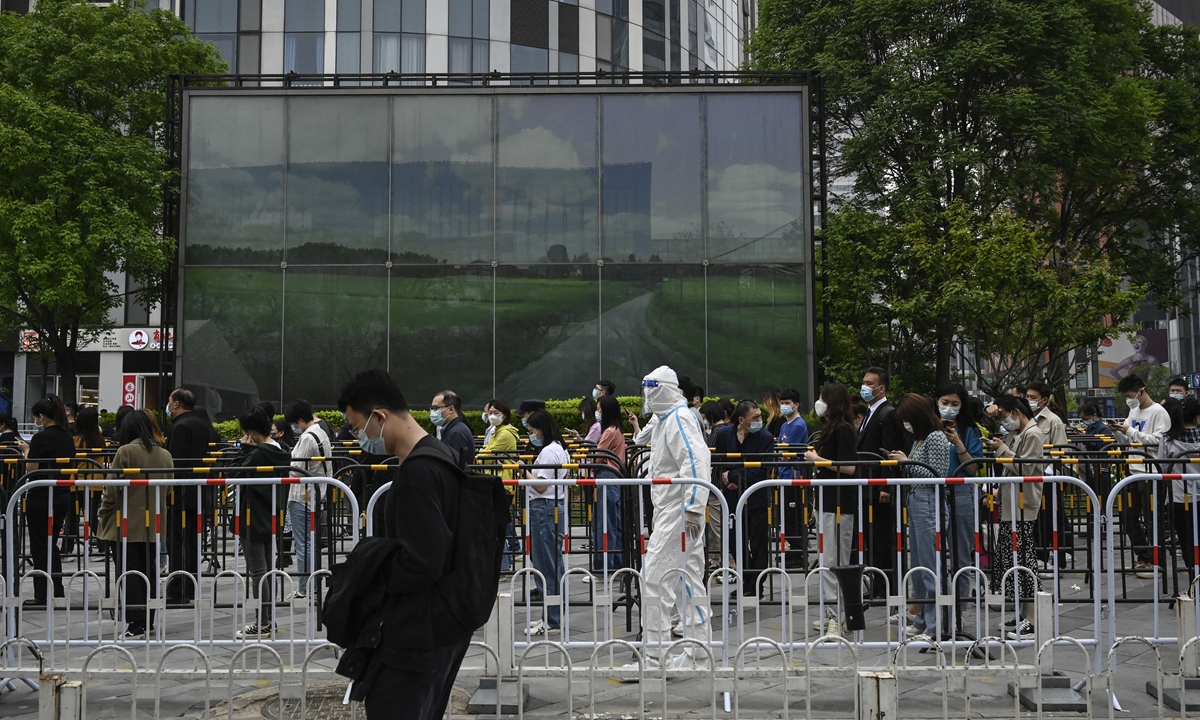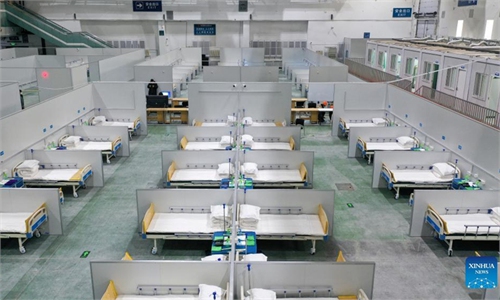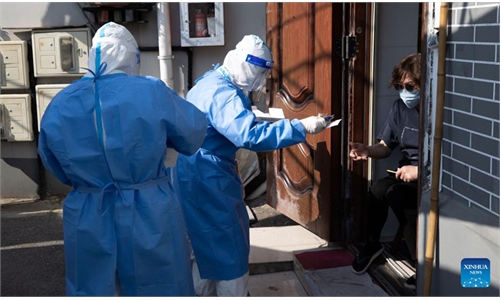Beijing issues new guideline for home quarantine, conditions ‘grow mature as most people vaccinated’

People wait in line to be tested for COVID-19 at a swab collection site in Beijing on April 25, 2022. Photo: AFP
As Beijing and Shanghai are in tug of war against Omicron, a new guideline for home quarantine issued by the Beijing municipal government, and Shanghai government's move to relocate residents in the whole building to isolation centers if one positive case was found, once again brought the discussions about home quarantine into the public spotlight.Epidemiologists said that conditions for home quarantine in China are growing more mature, with a vast percentage of the public inoculated with COVID-19 vaccines, and patients with mild symptoms and silent carriers should be allowed to be isolated at home, if certain conditions qualify.
Responding to a question about why residents in an entire building should be sent to a collective quarantine center, if only one positive COVID-19 case was found, Shanghai authorities explained at a Tuesday press conference that such a decision was made because residents of a building may be categorized as close contacts or secondary contacts.
If the positive case shares a kitchen with others, those people who live with the patient and people who live on the same floor, are defined as close contacts. People from the whole building are secondary contacts, Sun Xiaodong, deputy director of the Shanghai Municipal Center for Disease Control and Prevention (CDC), said during the press briefing on Tuesday.
Sun also said these are just principles for judgment, and comprehensive evaluations of specific situations are also needed; there should be no one-size-fits-all approach on this matter, he warned.
Shanghai's move has spurred wide discussion in the past few days as many people wonder if there is a clear guideline on who should be qualified as home quarantine and who should be sent to isolation centers.
Meanwhile, the government in Beijing, which has also been in a tough battle against COVID-19 flare-ups recently, updated its guidelines for home quarantine.
The guidelines said that home quarantine is only allowed for people who live in houses with independent kitchens and toilets; people who have air purge and drainage systems that won't contaminate those of other households, and people who are equipped with good ventilating conditions.
Those who live alone should be capable of taking care of themselves and those live with others should be arranged with a well-ventilated room. If conditions permit, separate toilet should be provided. If there are shared toilets, daily cleaning and disinfection are required, reads the guideline. People under home quarantine should not walk out of the door, and need to take a mixture of nasal swab and antigen tests during the quarantine period.
Public health experts believed that the updated guideline is clearer than the previous version and specifying conditions for kitchens and bathrooms for home isolation might be based on the fact that aerosols are an important transmission route for the coronavirus, which can travel through pipes.
Recently, one positive case was detected in Beijing's Chaoyang district. People living on the same floor and in the same column of the building were sent to a collective quarantine center as there are risks that the pipelines could cause a cross infection.
Several anti-COVID workers in Beijing communities told the Global Times that they received the new guideline, and were told to take people whose living conditions do not qualify for home quarantine to collective quarantine centers.
"We are still sticking to the quarantine list given by the local CDC," said one community worker in Beijing, saying that they are exploring ways as how to evaluate if one person is qualified to quarantine at home.
Beijing's move is seen by health experts as a trial of home isolation.
Zeng Guang, former chief epidemiologist of the CDC, told the Global Times that the conditions for China to allow home quarantine are getting more mature, as a vast portion of the public has been inoculated with vaccines.
If a worse situation than the current outbreak in Shanghai occurred in the future, when quarantine centers or hospitals are overloaded with patients, those with mild symptoms or silent carriers or close contacts, can be allowed to quarantine at home, said Zeng.
Yet he warned that such a relaxation comes with pre-conditions, as people who live with this person should all be vaccinated and have booster shots. The house needs to have a separate room, and no physical interactions should be allowed during the quarantine.



